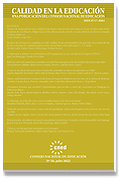Challenges for the Citizen Education in Chile: Opportunities and Limitations Analysis in the Developing of an Education for Global Citizenship within the New Curriculum Bases for Junior and Senior Years
DOI:
https://doi.org/10.31619/caledu.n56.1128Keywords:
New Curriculum Foundations, Citizenship Education, Education for Global Citizenship, participation, school, students, school climateAbstract
The complex socio-political scenario that Chile has experienced in recent years highlights the importance of citizenship education in schools. From the public policy area, the educational purposes of citizenship have been progressively expanded in the curricular frameworks, however, these have not yet incorporated the Global Citizenship approach, a perspective that has become fundamental to educate students in a globalized, complex and diverse context. The following research determines -through an exploratory and emergent study- the opportunities and limitations to shape citizenship from the perspective of Education for Global Citizenship in the guidelines of the New Curricular Bases for the 11th and 12th grades, issued in 2019, from the content analysis of the curricular documents. The main results showed that the proposal does not explicitly consider global citizenship, leaving it to the teacher"s criterion to incorporate this approach based on potential content and global issues. This highlights the relevance for teachers to have not only initial but also permanent training that allows them to adequately prepare the task of forming citizenship from different perspectives at schools.
Downloads
Published
Issue
Section
License
Authors retain their Copyright and only transfer a part of these to the journal, accepting the following conditions:
Authors keep their rights as authors and guarantee the right to the journal for the first publication of their work, which is simultaneously subject to the Creative Commons Attribution license allowing third parties to share the study accrediting the author and first publication in this journal.
Authors may adopt other non-exclusive license agreements for distribution of the version of the published work (e.g. inclusion in an institutional thematic file or publication in a monographic volume) accrediting initial publication in this journal.
Authors are allowed and recommended to share their work over the Internet (e.g. in institutional telematic files or their website) before and during the submission process, which may lead to interesting exchanges and increased citation of the published work. (See The effect of open access).

